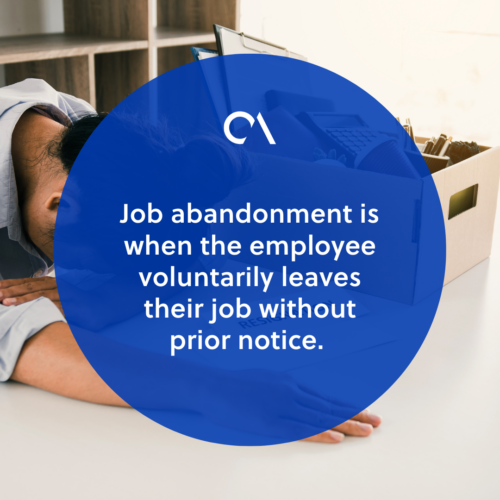5 signs of job abandonment all companies should know

Most workplaces today have transformed from traditional to upscale settings. Challenges in meeting different points of view and understanding between generations became top considerations.
Communication and proper ways of bridging the gaps draw a big picture in increasing cases of job abandonment in the workplace, both in the corporate and public sectors.
Understanding the factors that cause job abandonment and how to prevent it will make a difference in the workplace and your company’s working relationship.
What is job abandonment?
Job abandonment is when the employee voluntarily leaves their job without prior notice. It occurs when staff does not establish proper communication and turnover of tasks and has no intention of returning from a prolonged absence.
It differs from being absent for a few days due to emergencies or urgent personal errands.
Many employees choose this path, especially when mental and physical health are concerned. However, some organizations take this as a disturbing matter and use this to support the legal dismissal of the employee.
Because job abandonment is voluntary, the aftermath is that most employees lose their right to unemployment and separation benefits.

What are the triggering factors for job abandonment?
With the extent of inconvenience that it may cause, job abandonment should be one of the interests of companies and have an internal policy on how to avoid it.
Identifying the triggering factors that affect many employees is a great way to measure and outline proactive responses.
Here are the top triggering factors that all companies should know.
#1. Uneven workload distribution by employer
Maximizing the employees’ potential is a smart way to connect them to the organization. However, giving so much load to an employee can turn into work burnout.
Aside from the right compensation supporting the employee, knowing the ideal number of workers needed to accomplish such tasks is necessary.
Many firms are now starting to hire virtual assistants to support in-house employees in simple and repetitive tasks that may be time-consuming.
#2. A better opportunity
Every organization shall plot comprehensive career management and succession planning as a blueprint to guide each employee about career trajectory while staying in the company.
Many sectors are losing top-performing workers because of feeling stuck and have no movement in their careers. As a result, most of them abandon their jobs to seek new and brighter opportunities.
#3. Fear of confrontation and difficult conversation
Employees have different personalities and approaches when dealing with work challenges. Some are afraid to handle confrontations and difficult conversations that may result in arguments.
The capacity to gauge the different personas of the team will help office heads create a good relationship with their people.
Sometimes, workers abandon their jobs and choose freelance jobs they can accomplish remotely while still receiving a competitive salary.
#4. Unexpected personal or family emergency
Personal and family-related emergencies are always the main factor attracting many workers to leave their jobs.
Some companies tend to miss the importance of providing internal support and additional benefits for employees’ morale and welfare.
Many lose their battle and feel insignificant, leading to many factors affecting their desire to continue performing their role. Eventually, it results in many of them abandoning their jobs.

How to prevent job abandonment
After determining the factors that trigger many workers to leave their jobs, it is now easy to seek effective ways to avoid job abandonment.
Building a healthy work relationship is vital in acknowledging the worker’s importance and significance in the organization.
Here are the ideal and most effective ways to prevent job abandonment in the workplace:
- Communicate a plan for career advancement and succession to give your team direction and make them feel motivated.
- Acknowledge the accomplishments and contributions of the worker;
- Gauge the employee’s performance and maximize full potential by giving extra workloads and additional compensation and rewards.
- Internal policies shall stipulate and define the terms and conditions of cases, including job abandonment, to help workers make more accurate decisions.
- Be proactive in learning and dealing with the personal challenges of your workers. Provide different support mechanisms to help them regain focus and peace at work.
Preventing job abandonment will help keep some of your top-performing employees. But with good working conditions and a peaceful environment, the assurance for them to stay longer is more possible.
The prevention is not only particular to what internal policies may contain. It can also be attributed to innovative ways a company undertakes, including hiring support talents through outsourcing, where tedious and technical tasks can be performed virtually.







 Independent
Independent




